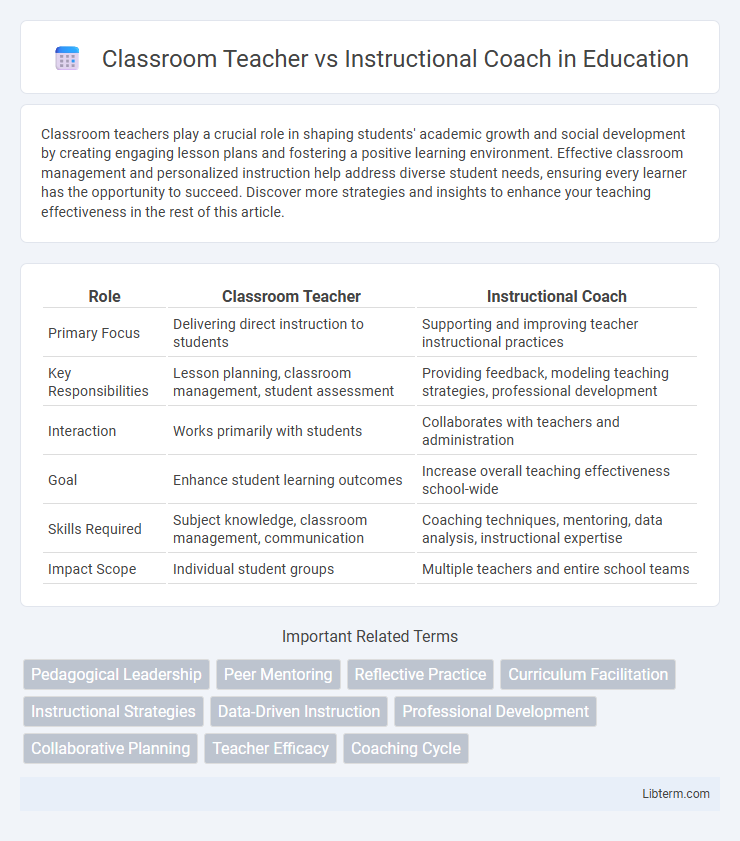Classroom teachers play a crucial role in shaping students' academic growth and social development by creating engaging lesson plans and fostering a positive learning environment. Effective classroom management and personalized instruction help address diverse student needs, ensuring every learner has the opportunity to succeed. Discover more strategies and insights to enhance your teaching effectiveness in the rest of this article.
Table of Comparison
| Role | Classroom Teacher | Instructional Coach |
|---|---|---|
| Primary Focus | Delivering direct instruction to students | Supporting and improving teacher instructional practices |
| Key Responsibilities | Lesson planning, classroom management, student assessment | Providing feedback, modeling teaching strategies, professional development |
| Interaction | Works primarily with students | Collaborates with teachers and administration |
| Goal | Enhance student learning outcomes | Increase overall teaching effectiveness school-wide |
| Skills Required | Subject knowledge, classroom management, communication | Coaching techniques, mentoring, data analysis, instructional expertise |
| Impact Scope | Individual student groups | Multiple teachers and entire school teams |
Defining the Roles: Classroom Teacher vs Instructional Coach
Classroom teachers deliver direct instruction and manage student learning within the classroom, focusing on curriculum implementation and student assessment. Instructional coaches support teachers by providing professional development, modeling teaching strategies, and analyzing instructional practices to enhance overall teaching effectiveness. The distinction lies in the classroom teacher's role as the primary educator and the instructional coach's role as a mentor and facilitator for continuous teacher growth.
Key Responsibilities and Daily Tasks
Classroom teachers primarily deliver direct instruction, manage student behavior, and assess student learning through daily lesson planning, grading, and individualized support. Instructional coaches focus on mentoring teachers, analyzing curriculum effectiveness, and facilitating professional development by observing classrooms, providing feedback, and implementing instructional strategies. Both roles aim to improve student outcomes, but teachers engage students directly while coaches build teacher capacity and instructional quality.
Educational Qualifications and Training Requirements
Classroom teachers typically require a bachelor's degree in education along with state certification or licensure that includes student teaching experience and pedagogy coursework. Instructional coaches often hold advanced degrees such as a master's or specialist degree in education or curriculum and instruction, supplemented by several years of successful teaching experience. Professional development for instructional coaches emphasizes leadership training, coaching techniques, and data-driven instructional strategies to support teacher growth.
Skills and Competencies Needed
Classroom teachers require strong classroom management, subject matter expertise, and the ability to deliver differentiated instruction tailored to diverse student needs. Instructional coaches must possess deep pedagogical knowledge, data analysis skills, and effective communication to mentor teachers and facilitate professional development. Both roles demand collaboration, adaptability, and continuous learning to enhance educational outcomes and support student achievement.
Impact on Student Learning Outcomes
Classroom teachers directly influence student learning outcomes through daily instruction, personalized feedback, and classroom management, enhancing student engagement and comprehension. Instructional coaches improve student achievement indirectly by supporting teachers with evidence-based strategies, professional development, and data-driven instructional adjustments. Research shows schools with effective instructional coaching experience gains in teacher efficacy, leading to higher student academic performance and improved standardized test scores.
Collaboration and Support Structures
Classroom teachers collaborate closely with instructional coaches to enhance teaching strategies and student outcomes through ongoing professional development and feedback loops. Instructional coaches provide targeted support by modeling best practices, analyzing student data, and facilitating reflective conversations that empower teachers to implement evidence-based methods. These support structures foster a collaborative culture, improving instructional quality and promoting continuous growth within schools.
Challenges Faced in Each Role
Classroom teachers face challenges such as managing diverse student needs, maintaining classroom discipline, and meeting curriculum standards while delivering effective instruction. Instructional coaches struggle with balancing personalized teacher support, adapting coaching strategies to varied educator skill levels, and demonstrating quantifiable impact on student achievement. Both roles demand constant professional development to address evolving educational demands and collaboration dynamics.
Professional Growth and Career Trajectory
Classroom teachers develop subject expertise and classroom management skills through daily student interaction and curriculum implementation, forming the foundation for professional growth. Instructional coaches leverage experience to mentor peers, facilitate professional development, and influence school-wide instructional strategies, accelerating leadership opportunities. Transitioning from classroom teacher to instructional coach broadens career trajectory by enhancing educational impact and expanding roles in teacher training and curriculum design.
Teacher and Coach: Bridging the Gap
Classroom teachers deliver daily instruction and manage student learning environments, while instructional coaches provide targeted support and professional development to enhance teaching practices. Teachers bring firsthand classroom experience, and coaches use this insight to tailor strategies that improve student outcomes. Effective collaboration between teachers and instructional coaches bridges gaps in pedagogy, fostering continuous instructional improvement and elevated academic achievement.
Choosing the Right Path: Which Role Suits You?
Classroom teachers focus on delivering curriculum and managing daily student interactions, building foundational skills and adapting lessons to diverse learning needs. Instructional coaches support educators by providing targeted professional development, refining teaching strategies, and fostering collaborative improvement in instructional methods. Choosing the right path depends on your passion for direct student engagement versus a preference for mentoring colleagues and influencing school-wide teaching practices.
Classroom Teacher Infographic

 libterm.com
libterm.com